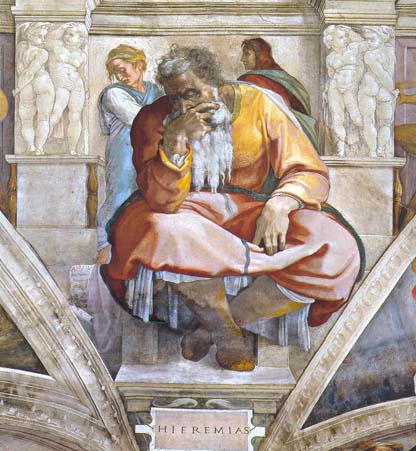 A small country, who wants to keep independence, must look for strong allies, to defend it from enemies. These were the allies the kings of Judea sought in the 7th century. before Christ. So they allied themselves with Assyria and Egypt. Thus, they ensured their prosperity, but they infected the country with the worship of foreign gods. Altars were built for the Assyrian gods. One of them was even standing in the temple grounds in Jerusalem. The rest were placed on mounds where pagan idols were worshiped. Even kings set a bad example, like for example. King Manasseh, who sacrificed his son to the idol Moloch. Failure to believe in the true God led to the oppression of the poor, to injustice and robbery. Pagan customs spread. King Josiah did fight them, but there were few such, who remained faithful to God.
A small country, who wants to keep independence, must look for strong allies, to defend it from enemies. These were the allies the kings of Judea sought in the 7th century. before Christ. So they allied themselves with Assyria and Egypt. Thus, they ensured their prosperity, but they infected the country with the worship of foreign gods. Altars were built for the Assyrian gods. One of them was even standing in the temple grounds in Jerusalem. The rest were placed on mounds where pagan idols were worshiped. Even kings set a bad example, like for example. King Manasseh, who sacrificed his son to the idol Moloch. Failure to believe in the true God led to the oppression of the poor, to injustice and robbery. Pagan customs spread. King Josiah did fight them, but there were few such, who remained faithful to God.
At that difficult moment, God called Jeremiah to be the prophet. Jeremiah was born about a year 650 before Christ in a deeply religious priestly family. He was one of the few, faithful to one God. He accepted the call to be a prophet with fear. For he was afraid of the hardships of this mission. But faithful to God's voice he felt, that he must obediently undertake this duty. So he writes about it :
"I told myself : I will no longer remember Him or speak in His name !
But then it began to consume my heart as if it were a fire bursting through my body.
I have been making efforts, to suppress it, but I couldn't " (Jr 20, 9).
Obeying God's commands, he breaks up with his current friends. He doesn't have a family, I want to be free from family responsibilities and work more effectively for God. In his name, Jeremiah cried out to the people : ,,Return apostate Israel, I will not show you a hard face, because I am merciful, I will not be angry forever " (Jr 3, 12). But his exhortations to repentance and return to God went unanswered. The people were deaf to the prophet's cry. Furthermore, he hated him for it, that he was announcing God's punishments, defeat and slavery. For the Israelites did not believe, that God can allow the temple to be destroyed and punish the chosen people. Jeremiah has deep sympathy for his people, that he is so blind and hardened to evil. It grieves over it, that the people despise God and reject Him, that he would rather listen to false prophets than believe the true God. But he does not stop in his cry. He proclaims the truth unpleasant to the nation and believes God completely.
In the time of Jeremiah, Assyria and Egypt slowly collapsed and a new power emerged - Babylonia. Wars begin, which do not pass now and Judea. The people are on the side of Assyria and Egypt, even after Nebuchadnezzar's victory, the king of babylon. Jeremiah calls for reason and peace. It encourages loyalty to Babylon. However, King Zedekiah did not obey him and rebelled. Then Nebuchadnezzar left for Palestine, he captured several fortresses and reached the capital. Jeremiah called desperately for the king, to surrender the city to the Babylonian armies, otherwise there will be no stone on stone from Jerusalem. The king, however, did not obey the prophet, and Jeremiah's enemies accused him of treason and threw him into a dungeon. In year 586 before Christ, Jerusalem fell after several months of siege. The prophet's prophecy has been fulfilled : the city is broken, the temple burned down. Nebuchadnezzar ordered King Zedekiah to gouge his eyes out, and a significant part of the population was taken captive.
Jeremiah suffered a lot. After all, he wanted to save the nation from these disasters, but the people rejected his advice. Underestimated in the homeland, Jeremiah was not recognized until the exiles in Babylonian captivity. There, his writings were read. Thanks to him, the nation, though he lost his homeland and temple, he kept faith in one God. In his writings, Jeremiah foretold the salvation of Israel and the return from captivity, making a new covenant between God and His people. The words of Jeremiah were of great comfort to the Chosen People :
“This will be the covenant, which I will make with the house of Israel after these days…
I will place my law in the depths of their being and write it on their hearts. I will be their God, and they will be my people” (Jr 31, 33).
From the first centuries of the Church, Jeremiah was viewed as being likeness to Christ. This prophet, like Christ, lived a holy life. He was faithful to God in spite of various adversities. Like Christ, he had to endure many adversities and sufferings from his brothers. Jeremiah lamented the destruction of the city of Jerusalem and made a painful lamentation, which at times applies to Christ : "Everybody, what way are you headed, take a look, Look, is there pain like this?, what overwhelms me " (Lm 1, 12).